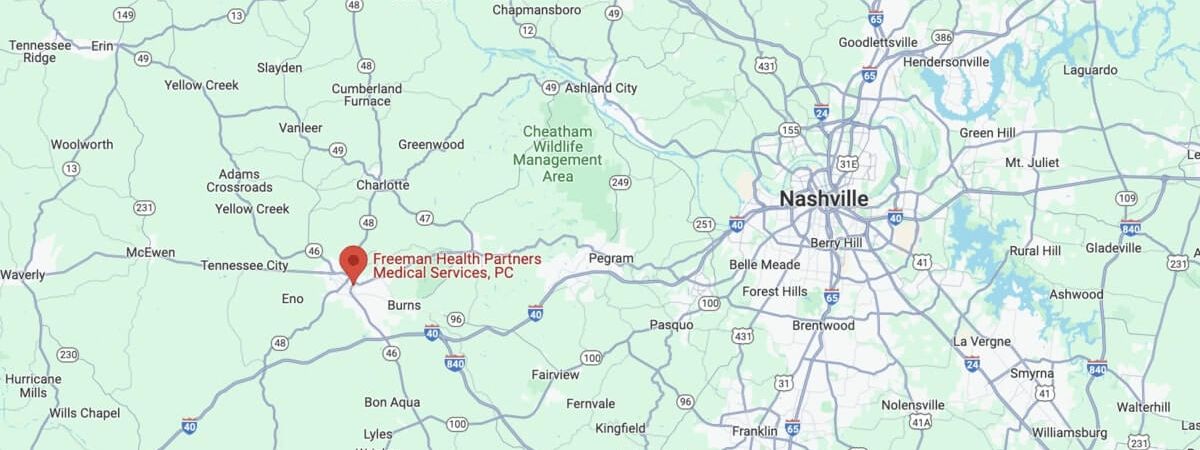Cognitive Behavioral Therapy (CBT) Treatment Programs Near Nashville, TN
Cognitive Behavioral Therapy (CBT)
Programs for Mental Health Treatment Near Nashville
Programs for Mental Health Treatment Near Nashville
Freeman Health Partners in Tennessee provides a comprehensive range of therapy programs, including Cognitive Behavioral Therapy (CBT), as part of our commitment to delivering top-notch mental health treatment and primary care services. Our approach is designed to support patients in achieving better mental and physical well-being.
We also offer specialized therapy programs for mental health, dual diagnosis, and primary care in Tennessee. By integrating these treatment services, we ensure that you receive well-rounded care, promoting long-term health and recovery. With Freeman Mental Health, you have a partner on your path to recuperation.

What is Cognitive Behavioral Therapy (CBT)?
Cognitive Behavioral Therapy (CBT) is a structured, goal-oriented form of psychotherapy that focuses on identifying and changing negative thought patterns and behaviors. It is widely used to treat various mental health conditions, helping people develop healthier ways of thinking and coping with challenges.
CBT is based on the idea that our thoughts, feelings, and behaviors are interconnected, and by altering negative thought patterns, we can influence our emotions and actions. This therapy is effective for a range of issues, including anxiety, depression, and stress, and is often short-term, with you seeing significant improvements in a relatively brief period..
Statistics and Information on Cognitive Behavioral Therapy (CBT) Options in Tennessee
In Nashville, thousands of people turn to Cognitive Behavioral Therapy (CBT) each year for mental health treatment. Recent data indicates that approximately 15,000 people in the city utilize CBT to manage conditions such as anxiety, depression, and stress. Across Tennessee, this number rises significantly, with an estimated 120,000 patients engaging in CBT annually for various mental health disorders.
Statewide, CBT is a popular choice not only for mental health issues but also for other challenges. Beyond treating mental health disorders, approximately 35,000 Tennesseans use CBT for reasons such as coping with chronic pain, managing insomnia, and addressing substance use disorders. This widespread use underscores CBT’s effectiveness and adaptability in helping you improve your overall quality of life.
Cognitive Behavioral Therapy (CBT) Treatment Provider Centers Near Me in the Nashville Area
Yes, there are Cognitive Behavioral Therapy (CBT) therapy centers in the Nashville area, including Freeman Health Partners, which is conveniently located near Nashville at 222 State Street, Dickson, TN 37055. Our facility offers a range of mental health services, including CBT, to help you manage and overcome various mental health challenges.
At Freeman Primary Care, we can carry out a comprehensive free assessment to determine the most suitable treatment options for your needs. Our admissions team is here to support you every step of the way. Call us at (615) 879-3582 or contact us here to book an assessment and take the first step toward better mental health.

Free Mental Health Assessments
How Successful is Cognitive Behavioral Therapy (CBT) in Tennessee?
Cognitive Behavioral Therapy has proven to be highly successful in Middle Tennessee, with many clients experiencing significant improvements in their mental health. Studies show that approximately 70-80% of people who engage in CBT report reduced symptoms of anxiety, depression, and other mental health disorders, making it one of the most effective therapies available.
In Middle Tennessee, CBT’s success is further highlighted by its widespread use in various settings, including private practices, community mental health centers, and primary care facilities. Its versatility in treating a range of conditions, from anxiety and depression to insomnia and chronic pain diseases, contributes to its high success rate in the region. Many people experience lasting positive changes after completing CBT programs.
What is a Cognitive Behavioral Therapy (CBT) Treatment Center?
A Cognitive Behavioral Therapy treatment center is a specialized facility that offers a range of therapeutic services, including cognitive therapy, behavioral therapy, and talk therapy. These centers focus on helping you address and modify cognitive distortions and negative behaviors through various techniques such as cognitive restructuring and behavior modification.
In addition to standard CBT, many treatment centers offer complementary therapies like mindfulness-based CBT, exposure therapy, interpersonal therapy, and dialectical behavior therapy (DBT). Some centers may also incorporate schema therapy, rational emotive behavior therapy (REBT), and solution-focused therapy to address complex mental health issues. The goal of these centers, like Freeman Mental Health, is to provide personalized care, empowering you to overcome challenges and achieve lasting mental and emotional well-being.
We Accept Most Major Insurance Providers in Tennessee
At Freeman Health Partners, we understand the financial concerns that accompany the decision to seek mental health and primary care services. That’s why we’re committed to making our services as accessible as possible by accepting most major insurance providers in Tennessee. This includes Aetna, Carelon, Blue Cross Blue Shield, Cigna, and Humana.
Our goal is to ensure that everyone who needs our help can receive it, regardless of their insurance coverage. We encourage you to take the first step towards better mental health by filling out our online form. This will allow us to determine your health insurance coverage levels for mental health and primary care services. By understanding what services your insurance covers, you can start your journey with confidence, knowing that you have the financial support you need.




Check Your Insurance By Phone
What Common Disorders and Diagnosis’s Does Cognitive Behavioral Therapy (CBT) Treat in Nashville?
Cognitive Behavioral Therapy is widely used in Nashville to treat various mental health and behavioral disorders. The following are common examples of conditions where CBT is effective, including depression, anxiety disorders, drug or alcohol addiction, mood disorders, anger problems, disordered eating, and OCD. This list highlights some of the many areas where CBT can provide support and improvement.
CBT for Depression
CBT for depression is highly effective, by helping you identify and change negative thought patterns and behaviors. Through CBT, you learn to challenge distorted thinking, develop healthier coping strategies, and set realistic goals, leading to improved mood and overall functioning. This approach promotes long-term recovery and emotional resilience.
CBT Anxiety Disorders
CBT effectively addresses anxiety disorders by helping you recognize and modify anxious thoughts and behaviors. CBT techniques, such as cognitive restructuring and exposure therapy, assist in reducing excessive worry and avoidance. You’ll learn practical skills to manage anxiety symptoms and gradually confront your fears, leading to increased confidence and reduced anxiety.
CBT Drug or Alcohol Addiction
CBT is a valuable tool in treating drug or alcohol addiction by addressing the underlying thoughts and behaviors that contribute to substance use. CBT helps you identify triggers, develop coping strategies, and change maladaptive thought patterns. This approach supports sustained recovery by encouraging healthier behaviors and reducing the risk of relapse.
CBT for Mood Disorders
Cognitive Behavioral Therapy is effective for managing mood disorders such as bipolar disorder and cyclothymia. It helps you understand and alter negative thought patterns and emotional responses. By using techniques like cognitive restructuring and behavioral activation, CBT assists in stabilizing mood, enhancing coping skills, and improving overall emotional regulation and quality of life.
CBT for Anger Problems
Cognitive Behavioral Therapy is effective in addressing anger problems by helping you recognize and alter the thought patterns and behaviors that fuel your anger. CBT techniques, such as cognitive restructuring and problem-solving, enable you to manage your emotional responses more effectively, improve communication skills, and develop healthier ways to handle anger and conflict.
CBT for Disordered Eating
CBT is highly effective for treating disordered eating by helping you identify and change harmful eating behaviors and distorted body image perceptions. Through CBT, you’ll learn to challenge negative thoughts about food and self-worth, develop healthier eating habits, and build a more positive relationship with your body, promoting long-term recovery.
CBT for OCD
Cognitive Behavioral Therapy for OCD, is a key treatment for focusing on reducing compulsive behaviors and intrusive thoughts. Techniques such as Exposure and Response Prevention (ERP) help you face your fears and resist engaging in rituals. CBT supports you in managing your symptoms, reducing the severity of OCD, and improving daily functioning.
Additionally, CBT for ADHD and CBT for PTSD are proven to be powerful solutions if you are struggling with those conditions. Set up an assessment with FHP to get started today with the admissions process.

What Are Therapeutic Techniques and Programs are Used to Treat Mental Health in CBT?
CBT utilizes a variety of therapeutic techniques to modify negative thought patterns and behaviors. Key techniques include cognitive restructuring, which involves identifying and challenging distorted thinking, and behavioral activation, which encourages engaging in positive activities to enhance mood. Exposure therapy is used to help you gradually confront and reduce fear responses, while problem-solving therapy highlights practical solutions to daily challenges.
Additionally, mindfulness-based strategies, such as mindfulness meditation, increase awareness and acceptance of one’s thoughts and feelings. Dialectical Behavior Therapy skills, including emotional regulation and distress tolerance, are integrated to manage intense emotions. These techniques work together to inspire lasting behavioral change and improve overall mental health and well-being.
What Are The Types of Cognitive Behavioral Therapy (CBT) Programs Offered in Middle Tennessee?
In Middle Tennessee, several types of Cognitive Behavioral Therapy are available to tackle various mental health needs. Commonly offered therapies include Acceptance and Commitment Therapy (ACT), Dialectical Behavior Therapy (DBT), Mindfulness-based Cognitive Therapy (MBCT), and Rational Emotive Behavior Therapy (REBT). These examples represent some of the diverse CBT approaches used to support mental well-being.
Acceptance and Commitment Therapy (ACT)
Acceptance and Commitment Therapy (ACT) is a type of Cognitive Behavioral Therapy that focuses on helping you accept your thoughts and feelings rather than trying to change them. ACT encourages mindfulness and commitment to values-based actions, guiding you to live a more fulfilling life despite the presence of difficult emotions or thoughts.
Dialectical Behavior Therapy (DBT)
Dialectical Behavior Therapy (DBT) is a specialized form of Cognitive Behavioral Therapy designed to help you manage intense emotions and improve interpersonal relationships. DBT combines standard CBT techniques with mindfulness and acceptance strategies, focusing on skills like emotional regulation, distress tolerance, and interpersonal effectiveness to promote your overall emotional stability and resilience.
Mindfulness-based Cognitive Therapy (MBCT)
Mindfulness-Based Cognitive Therapy (MBCT) combines traditional Cognitive Behavioral Therapy with mindfulness practices to help you manage depression and anxiety. MBCT teaches you to observe your thoughts and feelings without judgment, fostering greater self-awareness and acceptance. This approach aims to break the cycle of negative thinking and prevent relapse by enhancing emotional regulation and mindfulness.
Rational Emotive Behavior Therapy (REBT)
Rational Emotive Behavior Therapy (REBT) focuses on identifying and changing irrational beliefs that lead to emotional distress and maladaptive behaviors. Developed by Albert Ellis, REBT helps you recognize and challenge these beliefs, replacing them with more rational and constructive thoughts. This therapy strives to improve your emotional well-being and promote healthier, more adaptive behavior patterns.

Do Addiction Rehab and Mental Health Centers Offer CBT Treatment in Middle Tennessee?
Yes, addiction treatment and mental health centers in Middle Tennessee do offer Cognitive Behavioral Therapy. Freeman Health Partners specializes in providing CBT to support clients dealing with various mental health and addiction issues. Our approach integrates this effective therapy to help you manage symptoms and achieve lasting recovery.
Tennessee, known as the Volunteer State, offers a rich backdrop for CBT therapy with its unique cultural and historical charm. From the vibrant blues music and rock ‘n’ roll history of Beale Street to the soulful country music capital of Nashville (aka Music City), there’s a sense of Southern hospitality and cultural richness that enhances the therapeutic experience. The Smokies provide a serene environment, while local highlights like the Tennessee River, Jack Daniel’s Distillery, and Nashville hot chicken contribute to a welcoming atmosphere for healing and growth.
What’s the Differences Between Cognitive Behavioral Therapy (CBT) and Dialectical Behavior Therapy (DBT)?
Cognitive Behavioral Therapy and Dialectical Behavior Therapy are both effective therapeutic approaches but differ in their focus and techniques. CBT primarily addresses negative thought patterns and behaviors by challenging cognitive distortions and promoting healthier thinking. DBT, in contrast, integrates CBT with mindfulness and emotional regulation techniques to help you manage intense emotions and improve interpersonal skills.
In DBT vs CBT, DBT places a greater emphasis on balancing acceptance and change, utilizing skills like distress tolerance and interpersonal effectiveness. While CBT is generally used for a wide range of mental health conditions, DBT is specifically designed for people with severe emotional dysregulation, such as those with borderline personality disorder.

Does Health Insurance Cover CBT Therapy and Treatment Programs Near Me in Nashville, Tennessee?
Yes, many private health insurance plans cover Cognitive Behavioral Therapy (CBT) in Tennessee. Coverage varies depending on the insurance provider and plan specifics, but CBT is generally recognized as a medically necessary treatment for various mental health conditions, making it a commonly covered service.
To determine the exact coverage for CBT, it’s important to review your specific insurance policy details or contact us at Freeman Health Partners. Coverage may include therapy sessions with licensed professionals, but it’s essential to confirm any requirements such as referrals, copayments, or limitations on the number of sessions. For those seeking CBT, checking your policy can ensure you make the most of your benefits while accessing the needed care.
How Much Does CBT Cost in Tennessee Without Private Health Insurance?
For CBT therapy, Nashville, TN, involves costs that, without private health insurance, can vary widely depending on the therapist’s fees and the session length. On average, out-of-pocket expenses for CBT sessions range from $100 to $200 per hour. Rates may fluctuate based on the therapist’s experience and the specific services provided.
For those seeking Cognitive Behavior Therapy in Nashville, TN, it’s beneficial to explore options such as sliding scale fees or community mental health centers, which may offer reduced rates. Additionally, some therapists may provide payment plans or accept health savings accounts (HSAs) to help manage the cost of self-help therapy.
How Much Does CBT Counseling Cost in Near Nashville With Commercial Health Insurance?
With commercial health insurance, the cost of CBT counseling in Nashville, TN, typically involves paying a copayment or coinsurance for each session. On average, copayments range from $20 to $60 per visit, depending on the insurance plan and provider. Some plans may cover a portion of the cost, while others may require a deductible to be met before coverage kicks in.
To determine the exact cost of CBT counseling with your insurance, review your policy details or contact us at Freeman Mental Health. Coverage specifics can vary, so verifying benefits and out-of-pocket expenses will help you understand your financial responsibility for therapy sessions.
Check Your Insurance Coverage
Find out your health insurance coverage levels for by calling the number below.
- A&D Assessments Nashville, TN
- CBT Therapy Nashville
- Dialectical Behavioral Therapy TN
- Nashville Family Therapy Program
- Medication Assisted Treatment (MAT)
- Medication Management Nashville
- Programs for Mental Health Treatment
- Mental Health Intervention
- Mental Health Outpatient Program
- PHP Adolescent Program
- Primary Healthcare Clinician TN
- Private Mental Health Treatment
- Psychiatric Services Nashville
- Residential Treatment Tennessee
- Mental Health Therapy & Counseling
- TMS Therapy Nashville, TN
- EMDR Therapy Nashville, TN
- Addiction Counseling Program
Information and Statistics on Cognitive Behavioral Therapy (CBT) in The Nashville Area
- CBT may provide a viable alternative to antidepressant medication
- Numerous research studies suggest that CBT leads to significant improvement in functioning and quality of life
- CBT is usually considered short-term therapy — ranging from about 5 to 20 sessions
- Research has shown CBT to be very effective for anxiety disorders
- Studies show that CBT reliably reduced negative thinking

